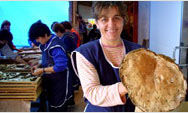Creating Opportunities for Business Educators in Azerbaijan
Through USAID’s School Economics Education (SEE) Program, the Lead Teacher Conference brought together 100 economics teachers, USAID representatives, Chief USAID Economic Advisor and Nobel Laureate Arnold Harberger, Junior Achievement Azerbaijan (JAA) Board members, and the local business community in Baku, Azerbaijan.
First organized in 2003 and conducted every two years, the Lead Teacher Conference introduces teaching strategies to secondary and vocational school teachers to enhance economic education in schools and colleges. The 2007 conference included interactive sessions on business and economics education, development of partnerships between schools in Azerbaijan and the U.S., student career guidance, and the use of information technology in education.
In his speech, Scott Taylor, USAID Country Coordinator for Azerbaijan, noted the role of SEE not only in student education, but in raising the level of teachers’ proficiency. “The SEE program creates opportunities to strengthen Azerbaijan’s cadre of educators,” Taylor explained. “This conference is a chance for economics teachers to share their successes and to seek out solutions to common challenges,” he said.
 |
Professor Arnold Harberger asserts that “investing in economic education is important to economic growth.”
Photo Credit: Junior Achievement Azerbaijan |
Professor Harberger delivered the conference keynote speech on state policy in economics. In addressing the role of education in economic development, he noted that, “[b]uilding a strong economy is a long-term process for any country. Economic growth comes from such factors as human and capital resources, making it important to invest in economic education to increase the country’s potential.”
Guest speaker Jeyhun Karamov from British Petrolium (BP) addressed the need for corporate social investment and described BP’s support for public initiatives in the country, particularly in the areas of education, community development and environmental protection. Karamov also noted the importance of programs like the SEE program in furthering Azerbaijan’s development.
As the basis for program sustainability, educators played an integral role in the Lead Teacher Conference. Highly successful veteran SEE teachers partnered with SEE staff and Bayaz Zahnalova, an evaluation expert from the Norwegian Refugee Council, to share ideas, successes, and best practices for International Partnerships, Creating Online Economics Projects, Interactive Methods of Teaching, Preparing Students for Careers in Business, and Project Evaluation. Addressing the significance of the conference for students as resources for the future, Sadiq Samadov, an economics teacher at Ali Bayramli School #10 explained, “The ideas introduced in this conference will greatly influence these teachers’ methods of preparing youth for their role in the economic and business life of Azerbaijan.”
At the awards ceremony nine teachers were recognized for their outstanding work on the SEE program. A special prize was awarded to the SEE alumni team from the State Oil Academy for taking first place worldwide at the Hewlett Packard Global Business Challenge.
The second day of the conference provided participants with the opportunity to reflect on their work over the past five years and to imagine ways of strengthening links among teachers and ensuring the sustainability of the SEE Program. Among the methods suggested for sustainability were creating online forums and message boards to continue the connections begun through the program and at the conference, and organizing themselves into an Economic Teachers Association to advocate for the advancement of economic education in the country.
Back to Top ^ |


